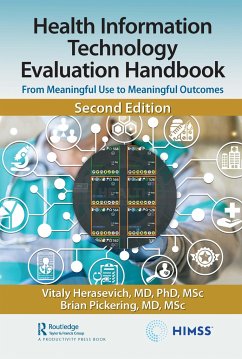Vitaly Herasevich MD Msc, Brian W Pickering MD Msc
Health Information Technology Evaluation Handbook
From Meaningful Use to Meaningful Outcomes
Vitaly Herasevich MD Msc, Brian W Pickering MD Msc
Health Information Technology Evaluation Handbook
From Meaningful Use to Meaningful Outcomes
- Gebundenes Buch
- Merkliste
- Auf die Merkliste
- Bewerten Bewerten
- Teilen
- Produkt teilen
- Produkterinnerung
- Produkterinnerung
Governments and clinical providers are investing billions of dollars in health information technologies (HIT). This is being done with the expectation that HIT adoption will translate into healthier patients experiencing better care at lower cost.
Andere Kunden interessierten sich auch für
![Healthcare It Transformation Healthcare It Transformation]() John C DoddHealthcare It Transformation80,99 €
John C DoddHealthcare It Transformation80,99 €![Health of South Asians in the United States Health of South Asians in the United States]() Health of South Asians in the United States223,99 €
Health of South Asians in the United States223,99 €![A Healthcare Solution A Healthcare Solution]() Mark A VonderembseA Healthcare Solution101,99 €
Mark A VonderembseA Healthcare Solution101,99 €![Nursing Informatics Nursing Informatics]() Nursing Informatics181,99 €
Nursing Informatics181,99 €![Confidently Chill Confidently Chill]() Duygu BalanConfidently Chill189,99 €
Duygu BalanConfidently Chill189,99 €![Pharmaceutical Supply Chain Pharmaceutical Supply Chain]() Fred A KuglinPharmaceutical Supply Chain119,99 €
Fred A KuglinPharmaceutical Supply Chain119,99 €![Healthcare Transformation Healthcare Transformation]() Maulik Joshi P HHealthcare Transformation202,99 €
Maulik Joshi P HHealthcare Transformation202,99 €-
-
-
Governments and clinical providers are investing billions of dollars in health information technologies (HIT). This is being done with the expectation that HIT adoption will translate into healthier patients experiencing better care at lower cost.
Hinweis: Dieser Artikel kann nur an eine deutsche Lieferadresse ausgeliefert werden.
Hinweis: Dieser Artikel kann nur an eine deutsche Lieferadresse ausgeliefert werden.
Produktdetails
- Produktdetails
- Verlag: Taylor & Francis
- 2nd edition
- Seitenzahl: 176
- Erscheinungstermin: 19. November 2021
- Englisch
- Abmessung: 254mm x 178mm x 13mm
- Gewicht: 567g
- ISBN-13: 9780367488215
- ISBN-10: 0367488213
- Artikelnr.: 62267584
- Herstellerkennzeichnung
- Libri GmbH
- Europaallee 1
- 36244 Bad Hersfeld
- 06621 890
- Verlag: Taylor & Francis
- 2nd edition
- Seitenzahl: 176
- Erscheinungstermin: 19. November 2021
- Englisch
- Abmessung: 254mm x 178mm x 13mm
- Gewicht: 567g
- ISBN-13: 9780367488215
- ISBN-10: 0367488213
- Artikelnr.: 62267584
- Herstellerkennzeichnung
- Libri GmbH
- Europaallee 1
- 36244 Bad Hersfeld
- 06621 890
Vitaly Herasevich is a Professor of Anesthesiology and Medicine in the Department of Anesthesiology and Perioperative Medicine, Division of Critical Care, Mayo Clinic, Rochester, Minnesota. He has been involved in medical informatics for over 20 years, with a specific concentration on applied clinical informatics in critical care and the science of healthcare delivery. He was born in Belarus, where he earned his MD and PhD degrees, and joined the Mayo Clinic in 2006. He codirects the Clinical Informatics in Intensive Care program as part of a research group that works to decrease complications and improve outcomes for critically ill patients through systematic research and quality improvement. He is interested in studying and developing clinical syndromic surveillance alerting systems ("sniffers"), clinical data visualization (novel patient-centered electronic medical records), and hybrid predictive and prescriptive analytics. He is co-inventor of many technologies including AWARE platform, resulting in technologies commercialization. He has co-authored over 100 peer-reviewed articles and authored three books and number of book chapters. As part of an education effort, Dr. Herasevich creates and teaches medical informatics classes at the Mayo Medical School and Mayo Graduate School. He is a Fellow of the Society Critical Care Medicine, Fellow of American Medical Informatics Association and a Senior Member of IEEE serving on a number of committees. Brian Pickering is an Associate Professor of Anesthesiology in the Department of Anesthesiology and Perioperative Medicine, Division of Critical Care, Mayo Clinic, Rochester, Minnesota. Dr. Pickering was born in Dublin, Ireland. He completed his medical education at Trinity College Dublin prior to his residency and fellowship training in anesthesiology and critical care at the College of Anesthetists, Royal College of Surgeons Ireland. He moved with his family to Rochester, Minnesota, in 2008 to complete further fellowship training in critical care at Mayo Clinic, where he currently practices. Dr. Pickering's primary research area is focused on improving the processes of care in the acute care setting to improve patient health and outcomes while reducing medical costs. Leveraging the sophisticated electronic infrastructure available at Mayo Clinic, Dr. Pickering's laboratory group have developed novel user interfaces, smart alerts, and reporting dashboards that target deviations from best practice and support healthcare providers to deliver a consistently high level of clinical performance to the bedside. With an established culture of innovation and patient-centered care models, the laboratory has unparalleled access to clinicians, clinical settings, homegrown technologies, and clinical information systems. This environment facilitates rapid bedside-to-bench and bench-to-bedside development cycles. The laboratories work has already led to practice improvement in Mayo Clinic ICUs through the implementation and adoption of a number of acute care clinical and administrative applications; several high profile funding awards; and intellectual property, which has been patented and licensed successfully by Mayo Clinic ventures. Together with institutional IT, the multidisciplinary team have developed a platform, AWARE, which addresses key safety concerns including, information overload, errors of omission, and workload associated with electronic medical record use.
Foreword. Preface. Acknowledgments. Authors. 1 The Foundation and
Pragmatics of HIT Evaluation. 2 Structure and Design of Evaluation Studies.
3 Study Design and Measurements Fundamentals. 4 Analyzing the Results of
Evaluation. 5 Proposing and Communicating the Results of Evaluation
Studies. 6 Safety Evaluation. 7 Cost Evaluation. 8 Efficacy and
Effectiveness Evaluation. 9 Usability Evaluation. 10 Case Studies. 11
Healthcare Artificial Intelligence Tools Evaluation. Index.
Pragmatics of HIT Evaluation. 2 Structure and Design of Evaluation Studies.
3 Study Design and Measurements Fundamentals. 4 Analyzing the Results of
Evaluation. 5 Proposing and Communicating the Results of Evaluation
Studies. 6 Safety Evaluation. 7 Cost Evaluation. 8 Efficacy and
Effectiveness Evaluation. 9 Usability Evaluation. 10 Case Studies. 11
Healthcare Artificial Intelligence Tools Evaluation. Index.
Foreword. Preface. Acknowledgments. Authors. 1 The Foundation and
Pragmatics of HIT Evaluation. 2 Structure and Design of Evaluation Studies.
3 Study Design and Measurements Fundamentals. 4 Analyzing the Results of
Evaluation. 5 Proposing and Communicating the Results of Evaluation
Studies. 6 Safety Evaluation. 7 Cost Evaluation. 8 Efficacy and
Effectiveness Evaluation. 9 Usability Evaluation. 10 Case Studies. 11
Healthcare Artificial Intelligence Tools Evaluation. Index.
Pragmatics of HIT Evaluation. 2 Structure and Design of Evaluation Studies.
3 Study Design and Measurements Fundamentals. 4 Analyzing the Results of
Evaluation. 5 Proposing and Communicating the Results of Evaluation
Studies. 6 Safety Evaluation. 7 Cost Evaluation. 8 Efficacy and
Effectiveness Evaluation. 9 Usability Evaluation. 10 Case Studies. 11
Healthcare Artificial Intelligence Tools Evaluation. Index.








